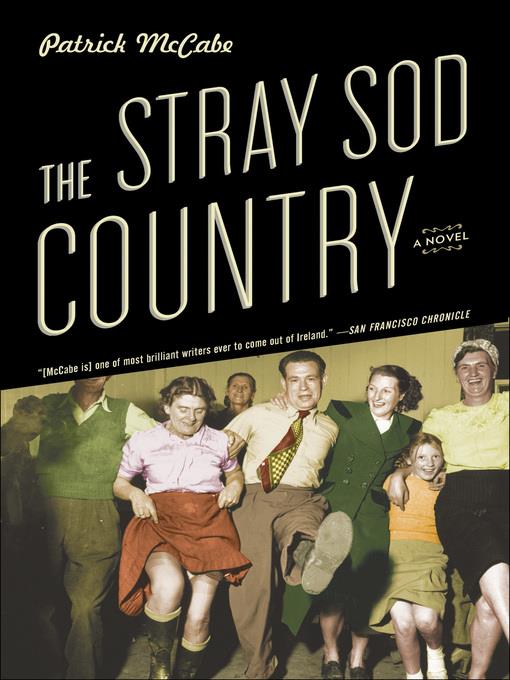
The Stray Sod Country
A Novel
- اطلاعات
- نقد و بررسی
- دیدگاه کاربران
نقد و بررسی

August 9, 2010
McCabe's enjoyable final installment to his Small-Town series (after The Holy City) is the charming and often dark ensemble story of Cullymore in 1957, a small Irish town near the U.K. border. While fending off death threats from the town outcast, local priest Father Hand announces an Easter play that is sure to be the envy of all Ireland (and, more importantly, his priestly nemesis). Fonsey O'Neill returns a changed man after 18 months in England and expects to marry his old flame, but she may have found someone new. Golly Murray, the Protestant wife of the Catholic barber, secretly yearns to see something horrible befall her condescending, well-to-do friend. And linking them all together is the omniscient and increasingly devious narrator, whose meddling and commentary inform the townspeople's feelings of being strangers in their own skin. McCabe astutely paints a portrait of life in one Irish village, where people struggle both to adapt to modernity and to keep their traditional demons at bay. Historically authentic and with a timeless resonance, this tale provides an appreciable balance of humor, poignancy, and that signature Irish warmth.

September 15, 2010
Cullymore, 1958. In this respectable border town, Protestants and Catholics rub elbows and politely knock heads. Everything seems the same, but chilling changes threaten civic and domestic order. Dogs are kicked and cats mutilated. A disgraced teacher plots to murder the parish priest. A schoolboy foments rebellion. The barber's charming wife wishes the banker's wife would die. And although almost no one wants to mention it, everyone has spied the Fetch lurking in their midst, waiting to escort one more soul to the Stray Sod Country. Whether he has a hand in the bizarre misfortunes plaguing Cullymore is anyone's guess. VERDICT Although Irish author McCabe (Winterwood) retreads familiar thematic ground here, he also expands and distorts his distinctively creepy creative landscape. Ultimately, he brilliantly upends James Joyce's view of the artist as a disinterested god to explore the satanic desires and impulses that move some of us to author evil. Funny and alarming, McCabe's latest provides a compelling counterpoint to other recent Irish fiction, notably Roddy Doyle's The Dead Republic and Trevor Byrne's Ghosts and Lightning.--J. Greg Matthews, Washington State Univ. Libs., Pullman
Copyright 2010 Library Journal, LLC Used with permission.

September 1, 2010
The Irish McCabe uses elements familiar from his previous work for his latest novel, a ghoulish small-town burlesque.
The town is Cullymore, on the Irish border; it was also the setting for his last novel (The Holy City, 2008, etc.). Once again, there will be violent episodes, fits of madness and sectarian (Catholic/Protestant) tensions. It's 1958. A scream erupts in the heart of town. Tongues wag. Has the devil struck again? Not to worry; the café owner has had an accident with her new electric mixer, but these are superstitious folks. They are happy enough on the outside, whether it's the smiley-faced butcher or the genial dentist, who organizes innocent (or are they?) dances for teenagers; underneath it's a darker story. The feud between Father Gus Hand and the disgraced, half-mad teacher James A. Reilly is out in the open. It dates back to 1940, when the men were on the staff of the same seminary. One day in class, Reilly kissed a male student on the lips and was promptly expelled; he has never forgiven the priest for his ouster. Now he lives in a hovel, oiling his ancient rifle, still plotting his revenge, which will spark the climax. Among an array of cartoonishly drawn characters, they are the most notable, along with the sweetly vulnerable Golly, a Protestant married to the Catholic barber; their mixed marriage has made her the target of her fellow Protestant Blossom, the odious, hoity-toity bank manager's wife. Peeping out from behind the curtain is the omniscient narrator, a malevolent figure whose tricks force Golly into the loony bin. Toward the end we move into the 1970s, so the narrator can kill off characters for sport. The novel's less-than-original conclusion is that we are all strangers to one another, a lesson taught by the Stray Sod Country of folklore.
This is the last of McCabe's small-town series. Hopefully the change of venue will liberate this talented author.(COPYRIGHT (2010) KIRKUS REVIEWS/NIELSEN BUSINESS MEDIA, INC. ALL RIGHTS RESERVED.)

October 1, 2010
Cullymore in 1958 is a backwater on the border between the north and south of Ireland. This complex literary novel focuses on the daily lives of its Catholic residents and their interactions with each other and Protestant fellow citizens. Central to the story is the outrageous Father Hand whose plans to bring Cullymore to national attention include resurrecting an ancient Easter rite while his parishioners act out the Crucifixion of Christ on Good Friday. The omniscient narrator is a malicious and contrary spirit who, as the story progresses, assumes a more active part by leading some characters to behave in ways they loathe or to believe in and act upon the unreal. The slowly unfolding plotincluding flashbacks and flash-forwardsand the complexity of the subplots produce scenes of heartbreaking tragedy alternating with humor that ranges from the burlesque to the darkly sardonic. Followers of modern Irish fiction as well as admirers of stylists such as Cormac McCarthy are the audience for this fictional take on one historical era in the countrys long and difficult history.(Reprinted with permission of Booklist, copyright 2010, American Library Association.)




دیدگاه کاربران